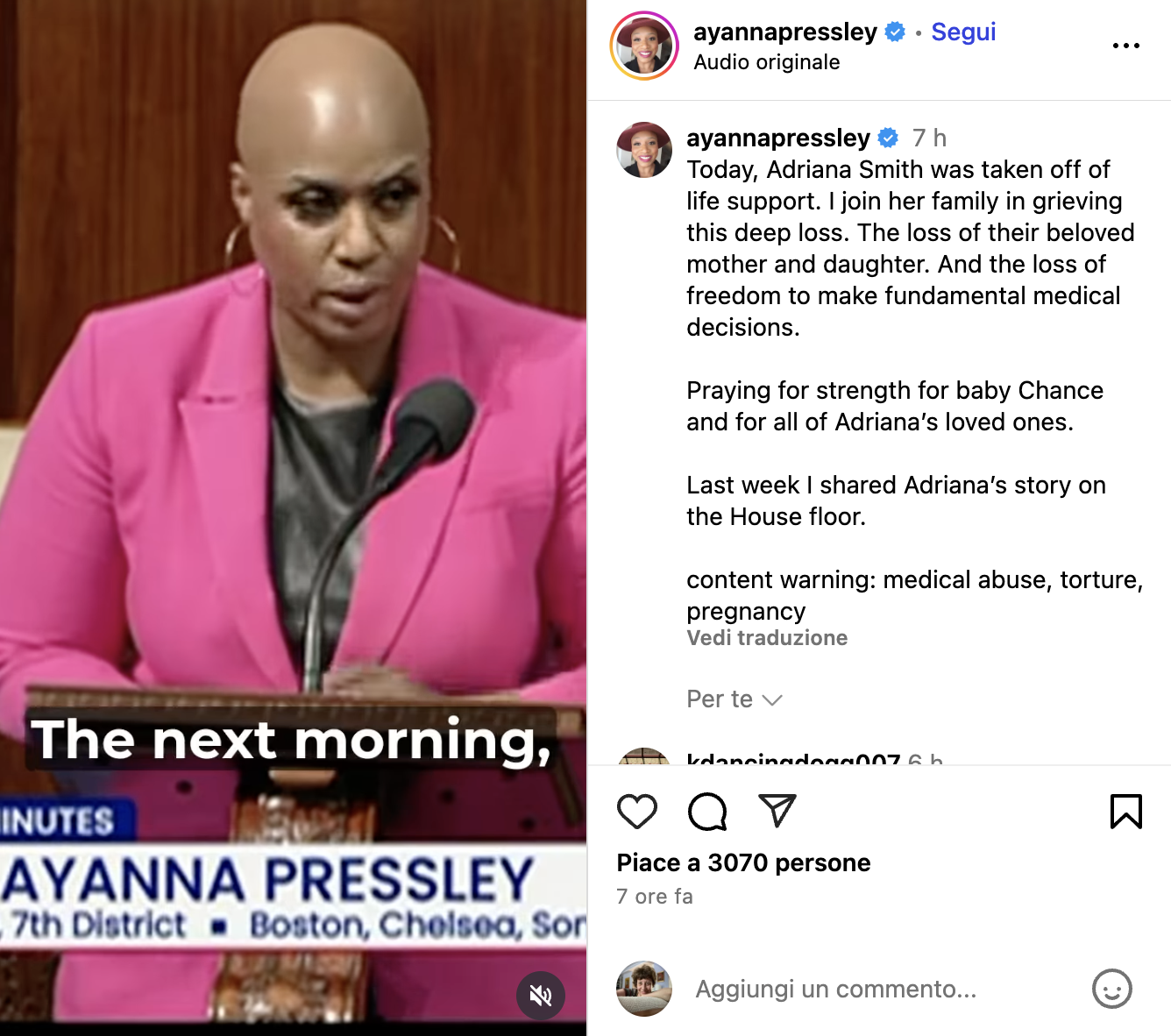The machines were turned off; Adriana Smith is no more. The young woman, kept alive against her family’s wishes because she was pregnant, despite being brain-dead, gave birth via C-section to a baby boy on June 13, and was taken off life support on Tuesday the 17th. Baby Chance is in the hospital; the family is praying for him. This tragic story happens in Atlanta, Georgia, one of the states with the strictest laws on abortion and pregnancy management.
“Today, Adriana Smith was taken off life support. I join her family in mourning,” said Massachusetts Congresswoman Ayanna Pressley on Instagram. “The loss of a beloved mother and daughter. And the loss of freedom to make fundamental medical decisions. Praying for strength for baby Chance and for all of Adriana’s loved ones.”

Adriana Smith was two months pregnant at the time of her brain death, a non-reversible condition after which death is typically declared.
Thirty years old and a nurse, she was mother to a seven-year-old. She went to the hospital in Atlanta on February 9 with a severe headache. According to her family, she was only given painkillers and was not subjected to any diagnostic tests. On February 19, she was urgently admitted to Emory University Hospital, where a CT scan revealed blood clots in her brain. That same day, she was declared brain-dead. She was two months pregnant.
Chance was born via emergency C-section on June 13, said Smith’s mother, April Newkirk, to local broadcaster 11Alive, which was the first to report the story. He is in the neonatal intensive care unit and weighs about 1.8 pounds, but “they say he’s going to be okay,” said Newkirk. “He’s fighting. We just want prayers for him. Please keep praying for him. He’s here now…”
At the time of the hospitalization, Newkirk explained that doctors insisted Adriana remain connected to the ventilator. They told the family that, under Georgia law—which bans abortion after six weeks—she had to be kept alive artificially to preserve the pregnancy. The abortion ban includes provisions that strengthen the concept of “fetal personhood,” a doctrine under which embryos and fetuses are granted full legal rights and protections. In practice, as reproductive rights activists stress, this can mean prioritizing the rights of the fetus over those of the pregnant woman.
“We had no say in the matter,” Newkirk had said before Chance’s birth. “We want the baby. He’s part of my daughter. But the decision should have been ours—not the State’s.”
The hospital declined to comment on the case, citing privacy regulations. In a statement to the Associated Press, the hospital said it “uses consensus from clinical experts, medical literature, and legal guidance to support our providers as they make individualized treatment recommendations in compliance with Georgia’s abortion laws and all other applicable laws. Our top priorities continue to be the safety and wellbeing of the patients we serve.”
However, Georgia Attorney General Chris Carr’s office issued a note stating that the state law does not require healthcare professionals to keep brain-dead women on life support. “Removing life support is not an action with the purpose to terminate a pregnancy,” said his spokesperson Kara Murray.
Newkirk told 11Alive that if she could speak to her daughter one more time, she would tell her she was a good daughter. “I’m her mother,” Newkirk said. “I shouldn’t be the one burying my daughter. My daughter should be burying me.”
The case has highlighted the ethical challenges and limitations of Georgia’s abortion law, which came into effect in 2022 after the U.S. Supreme Court overturned the landmark Roe v. Wade ruling. That ruling had, for fifty years, guaranteed the federal right to abortion across the United States, before the decision was handed back to individual states.












